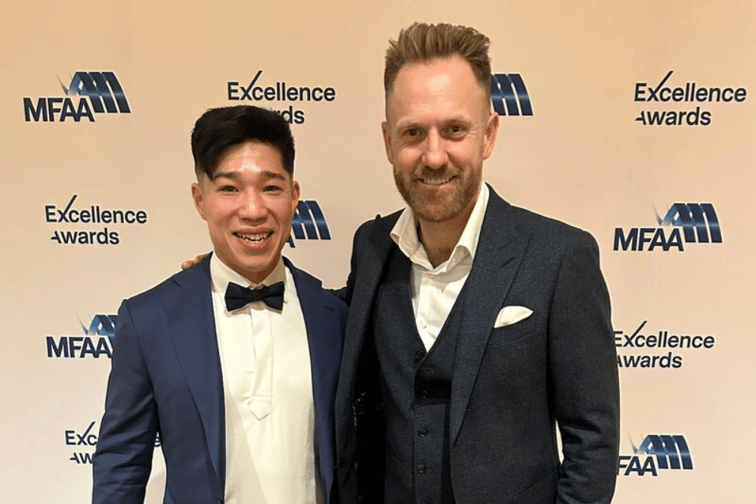

A friendship founded on business is better than a business founded on friendship, according to Chris Bates and Ben Sum, partners at online brokerage Blusk.
Sum (pictured above left) and Bates (pictured above right) recently celebrated their fifth anniversary of working together by attending a recent awards ceremony where they were both finalists in two categories.
“We didn't win either on the night but there were multiple memorable moments, when I felt so grateful for what we have achieved together as business partners and now as true-life friends,” Bates said.
“We have been there for each other through our multiple kids, life challenges, home moves and growing our team from just us to 17. We chat daily, just as much now about our families as we do about our business together.”
Sum agreed, saying that it was rare to have such an amazing business partnership centred around a common goal.
“We’ve never had one argument over five years,” Sum said. “We both have made mistakes, but we learn from them, support each other, and grow from it. That’s the foundation to an awesome relationship.”
The power of podcasts
As the founder of Blusk, Bates was juggling various responsibilities but with limited time he needed someone to manage the backend operations.
“Basically, I was having trouble growing the business and I had too many leads than I could handle. I tried outsourcing and employing new team members, but it wasn’t working,” Bates said.
Old colleagues at a financial planning firm, Sum and Bates had kept in contact throughout the years.
After hearing about Bates’ struggles to grow on a podcast he was listening to, Sum stepped in, bringing crucial skills and expertise to handle loan strategies, document processing, bank interactions, and settlements.
The initial partnership began as a handshake agreement but quickly evolved into a formal arrangement, with Bates focusing on client acquisition and guidance while Sum managed the backend processes.
“Ben and I knew each other through work but we weren’t really connected. We weren’t friends or anything, but we respected each other,” said Bates. “Straight away, I realised that he was the missing ingredient. Ben's key skill sets were all the things that I needed.”
Despite a challenging market environment in 2018, marked by falling property prices and the Royal Commission's impact, their collaboration propelled Blusk's settlement figures from modest levels to an impressive upward trajectory.
From around $40 million settled in 2018, the brokerage has grown to $320m in the latest financial year.
“We’ve also grown our team to 17 to invest in our next phase of growth where the plan is to hit $1 billion in the next few years,” said Bates.
Business first and then friendship
While going into business with your mates may be tempting when discussing it over a couple of bevvies, Bates urged against making such a move “because you need to know how they (friends) work in a professional environment”.
“What is their work ethic? Their attention to detail? Are your values aligned? If it’s not aligned across these metrics and it’s just an alignment because you are friends, you run the risk of having your personal and professional lives become too interlinked,” said Bates.
“You start having phone calls where you question if they are calling as a mate or a business partner. It can work but you’d need to set those professional alignments first.”
Another key to success as a broker, according to Bates and Sum, is to ensure that your skills complement each other rather than compete, a lesson they have learned firsthand.
“There’s no point in going into business with someone if you are both great at finding business,” said Bates. “It’ll only compound your problems. Sometimes less cooks in the kitchen are better.”
Sum agreed, saying his technical skills amplified Bates’ people skills.
“Brokerages need both skill sets to excel, and it doesn’t have to be just you,” Sum said. “When we come together, we are a force to be reckoned with.”
The yin to your yang
With 46% of brokerages consisting of sole operators, according to the MFAA’s latest Industry Intelligence Service report, Sum urged his industry peers to consider partnering up.
“There’s a lot of stories in the media about when working relationships go wrong and I think that might prevent some solo brokers from pursuing a partnership,” Sum said.
“Trust me, it’s going to be a lot easier when you partner up with someone than doing it all on your own. We have both done it solo and we are thankful we are not any more.”
Bates echoed this advice, saying many people talked business owners out of partnerships due to the challenges and issues when it didn’t work out and the fear of losing control.
“However, if you find the right person who you deeply trust and connect with – the yin to your yang – and the one who thrives where you barely survive, building a business will not only be much more enjoyable when shared but much more scalable,” Bates said.
“So if you're thinking about partnerships, lean into the fear, put the plan together, get independent advice and take that leap of faith in to unknown.”
Do you agree with the above? Let us know in the comments below.
